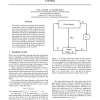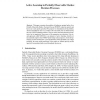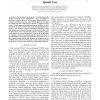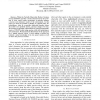GLOBECOM
2007
IEEE
14 years 9 months ago
2007
IEEE
We design opportunistic spectrum access strategies for improving spectrum efficiency. In each slot, a secondary user chooses a subset of channels to sense and decides whether to ac...
COLT
2000
Springer
14 years 10 months ago
2000
Springer
We model reinforcement learning as the problem of learning to control a Partially Observable Markov Decision Process ( ¢¡¤£¦¥§ ), and focus on gradient ascent approache...
ECML
2005
Springer
14 years 11 months ago
2005
Springer
This paper examines the problem of finding an optimal policy for a Partially Observable Markov Decision Process (POMDP) when the model is not known or is only poorly specified. W...
IAT
2005
IEEE
14 years 11 months ago
2005
IEEE
Partially observable Markov decision process (POMDP) is commonly used to model a stochastic environment with unobservable states for supporting optimal decision making. Computing ...
ICRA
2007
IEEE
15 years 2 days ago
2007
IEEE
Abstract— We provide a method for planning under uncertainty for robotic manipulation by partitioning the configuration space into a set of regions that are closed under complia...
ICRA
2007
IEEE
15 years 2 days ago
2007
IEEE
— We introduce the Oracular Partially Observable Markov Decision Process (OPOMDP), a type of POMDP in which the world produces no observations; instead there is an “oracle,” ...
ICRA
2007
IEEE
15 years 2 days ago
2007
IEEE
— While the Partially Observable Markov Decision Process (POMDP) provides a formal framework for the problem of robot control under uncertainty, it typically assumes a known and ...
ICC
2007
IEEE
15 years 2 days ago
2007
IEEE
We consider opportunistic spectrum access for secondary users over multiple channels whose occupancy by primary users is modeled as discrete-time Markov processes. Due to hardware...
DATE
2007
IEEE
15 years 3 days ago
2007
IEEE
As the hardware and software complexity grows, it is unlikely for the power management hardware/software to have a full observation of the entire system status. In this paper, we ...
ICC
2008
IEEE
15 years 6 days ago
2008
IEEE
—We consider opportunistic communications over multiple channels where the state (“good” or “bad”) of each channel evolves as independent and identically distributed Mark...




